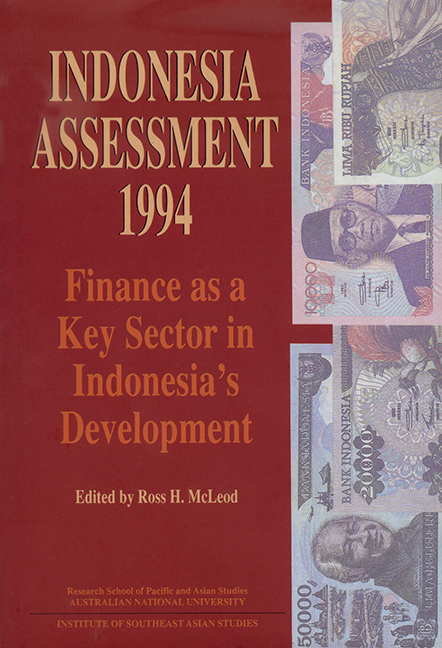1 - Introduction
Published online by Cambridge University Press: 21 October 2015
Summary
Background
A little over a decade ago, I wrote a survey of Indonesia's financial sector, in which I emphasised the extent to which its development had been repressed, and drew attention to its domination by state- owned institutions. I asserted that ‘[t]here have been no major changes … in the kinds of policies adopted concerning money and finance’, and predicted that the future only promised ‘more of the same’—even going so far as to say that government interventions could ‘be expected to be extended’ (McLeod 1984:106-107). These words were actually written in 1982 and, to my embarrassment, the predictions had been proven totally wrong several months before the paper even was published. For me, this experience has reinforced the idea that economists should be content to restrict themselves to the safer tasks of analysing and explaining what has already happened, and avoiding the temptation to foretell the future!
Indonesia's financial sector in fact has been totally transformed in the decade or so since a wide-ranging package of deregulatory measures for the banking sector was introduced on June 1,1983. The obvious success of that package—'Pakjun’ as it was known—together with the awareness that many significantly counterproductive regulatory interventions were still in existence, emboldened the government to introduce an even more radically deregulatory package a little over five years later, on 27 October, 1988. It seemed natural to dub this ‘Pakto’, but the Indonesian penchant for coining new words using selected syllables from small groups of words such as ‘Paket Oktober’ would soon be tested by the increasing frequency with which new policy packages were beginning to appear, and the fact that there are only twelve months in the year. The collection now includes Pakjan, Pakfeb, Pakmar, Pakmei, Pakjun, Pakjul and Pakto, as well as Pakdes I and II.
In the early 1980s, the contribution of Indonesia's financial sector to the development process remained exceedingly modest. The sector was almost totally dominated by the banking system which, in turn, was dominated by a small number of very large state-owned institutions.
- Type
- Chapter
- Information
- Indonesia Assessment 1994Finance as a Key Sector in Indonesia's Development, pp. 1 - 18Publisher: ISEAS–Yusof Ishak InstitutePrint publication year: 1994

